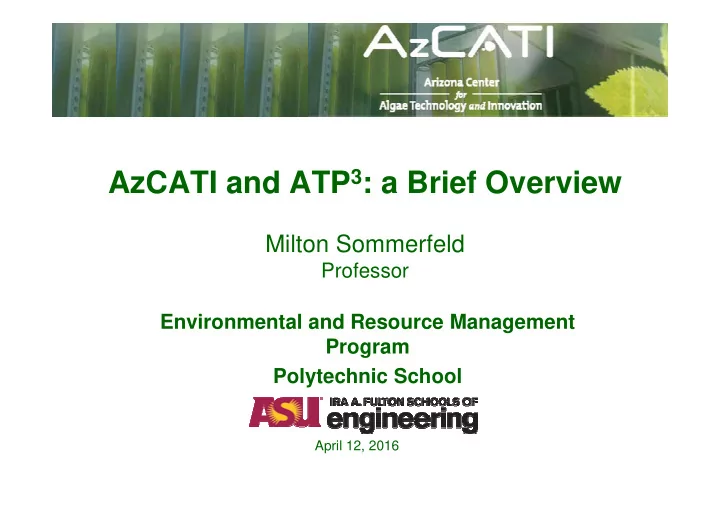

AzCATI and ATP 3 : a Brief Overview Milton Sommerfeld Professor Environmental and Resource Management Program Polytechnic School April 12, 2016
The Arizona Center for Algae Technology and Innovation (AzCATI) Formed in 2010 through stimulus funds designated by the Science Foundation Arizona and Governor’s Office to serve as a hub for research, testing, and commercialization of algae-based products. • Advance • Collaborate • Educate • Launch
Why Algae? High productivity wWass ’t require a lot of land High productivity relative to Requires less land other plants/crops Does not require arable land Doesn’t compete for crop land for production– adds value to used for typical crops unproductive lands Able to use waste and salt Doesn’t use our drinkable water water resources Able to recycle carbon dioxide Turns a liability into an asset Produces oils for a range of Uses existing infrastructure for biofuels; gasoline, diesel, jet processing of the fuels fuel Able to produce valuable co- Makes for more affordable products fuels and other products
Algal Biotechnology Neutraceuticals Renewable energy Human Fertilizers food Animal feed Aquaculture Wastewater treatment
AzCATI Laboratories 19,300 sq ft Office & Lab space
labsf & offic2012e Four Acre Outdoor Field Site Research and Test Bed
ATP 3 ’s Two Main Objectives Collaborative Open Testbeds • Network of testing facilities for the algal research community for algal biomass production. • Enable the acceleration of applied algae research to lead to commercial applications. High Impact Data from Long Term Algal Cultivation Trials • Implement a unified experimental program across different regional, seasonal, environmental and operational conditions with promising algae strains. • Make trial data widely available to the research community.
Collaborative Open Testbeds ATP 3 offers access to a wide array of services: Stakeholder Access to Facilities Testbed locations Regional testbed facilities for the partnership are physically located in Arizona, Hawaii, California, Georgia, and Florida.
Education & training • Quarterly educational workshops hosted at ATP 3 sites • Well attended by broad mix of academic and industrial participants
Education & Training Workshops • ATP 3 has hosted 7 quarterly educational workshops • Over 30 lecture modules • Over 15 hands-on field site and laboratory activities • Well attended by broad mix of academic and industrial participants • More than 200 participants representing > 70 different organizations • 35% Foreign participants • Recent workshops: “Large-Scale Cultivation and Downstream Processing (November 2015; Mesa, AZ) “Principles and Processes: Algae Culture Maintenance, Production and Downstream Processing” (May 2015; NREL and CSM, Golden, CO
Algae- Solution for Sustainable Energy, Feed and the Environment Photobioreactor CO 2 from power Treated gases plant flue gases Nutrients (N, P) Treated water from wastewater Jet fuel Food-Feed Biodiesel Fertilizer Green diesel Gasoline Additives Biopolymers Minerals Petro-chemicals Algal oil Biomass residues Algae biomass
Recommend
More recommend